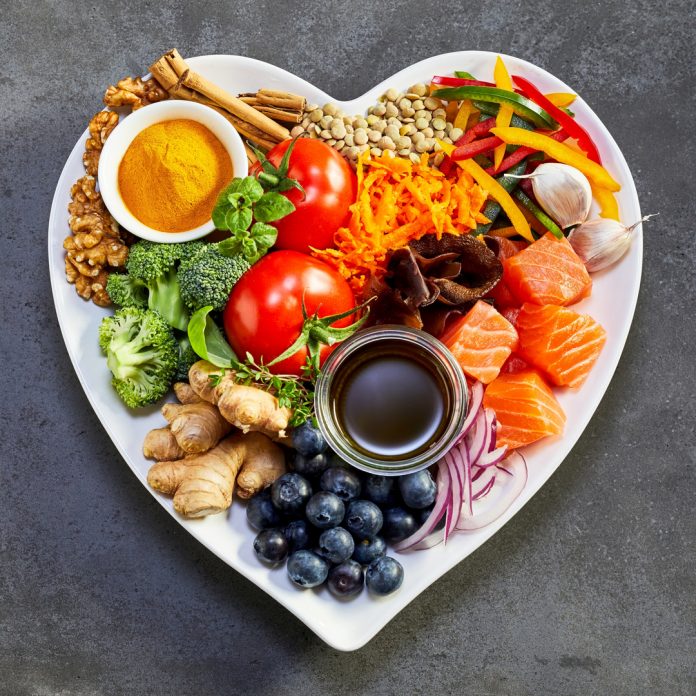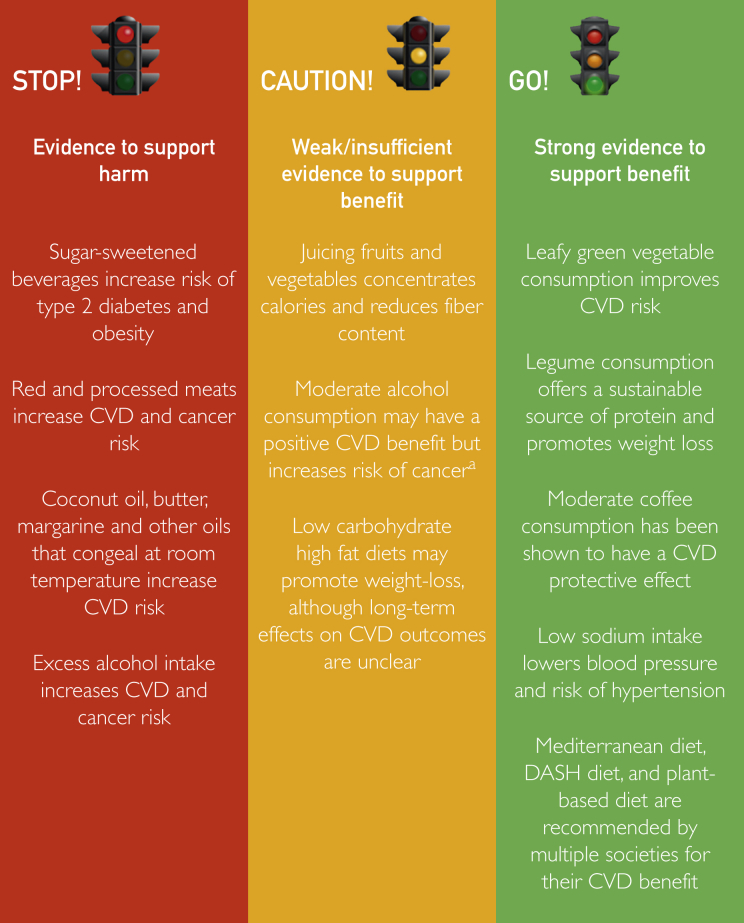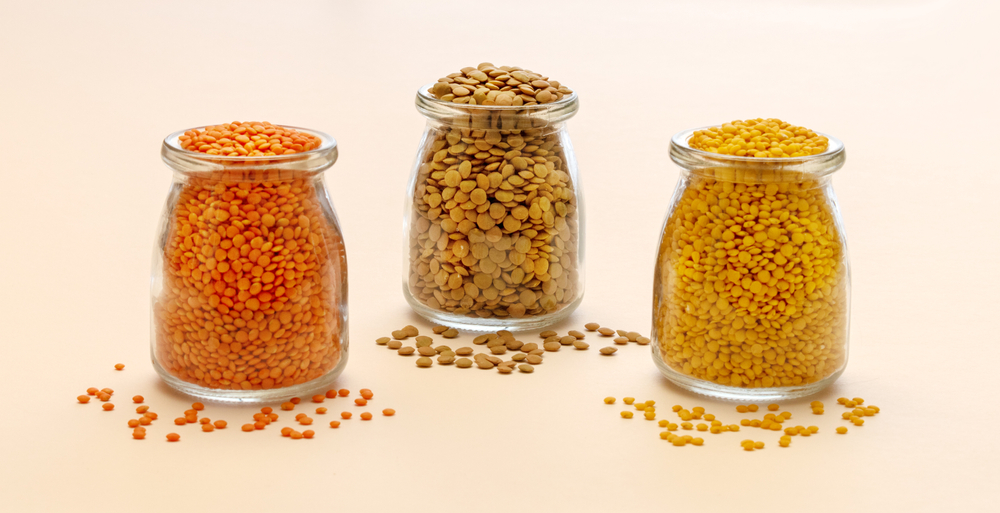Dietary modification is the cornerstone of the prevention of cardiovascular disease (CVD), writes Deepa Desa
It is of grave concern that the mortality rate of cardiovascular disease (CVD) lately appears to be on the rise. This is despite continued advances in health care especially with regard to cardiovascular research. We all know of the sudden demise of fairly young people in their 40s due to a fatal cardiac arrest, especially during the past year. We also know too well that a poor diet is a leading cause of obesity and Type 2 diabetes mellitus, which are leading contributors to CVD morbidity and mortality.
Although dietary modification is a cornerstone of CVD prevention, research points out that it is not implemented seriously.
The focus must be on implementing a general food plan that is high in fruits, whole grains, legumes, and no starchy vegetables (less white potatoes and more broccoli), while low in trans-fats, saturated fats, sodium, red meat, refined carbohydrates and sugar-sweetened beverages.
Vegetable consumption is pivotal for cardiovascular health and universally recommended. Whole fruits are similarly recommended across a variety of heart-healthy diets due to their antioxidant and anti-inflammatory effects, high satiety profile, and generally low glycemic index. Berries in particular are associated with flavonoids called anthocyanins, which regulate endothelial function and glycemic metabolism.
Fish is an especially beneficial source of Omega-3 polyunsaturated fatty acids. Japan has the highest ingestion of fish. No surprise here it has the lowest risk for Coronary Heard Disease (CHD) in the world.
The majority of sodium consumption in our typical diet comes from sodium added before consumer purchase, mostly in packaged and processed foods. A serious attempt to limit the ‘Salty 6’, which are composed of cold cuts/cured meats, pre-seasoned poultry, sandwiches, bread, canned soup, and pizza will work well for heart health.
Saturated fat and trans-fat intake have been shown to increase serum LDL-C levels and increase the risk for CHD. Despite health claims purporting the benefit of coconut oil in popular media, the (US) National Lipid Association has concluded that there is no evidence supporting the health benefits of coconut oil and furthermore acknowledges that its use must be limited in the heart-healthy diet due to its propensity to increase LDL-C and non–HDL-C levels. Butter has 51 gm of saturated fat per 100 gm. In contrast, canola and olive oil, which can be substituted for butter, have 7 gm and 14 gm of saturated fat, respectively. Applesauce, which has no saturated fat, can be substituted for butter in baking. By making these easy substitutions, saturated fat content can be lowered dramatically. Coconut oil has 87 gm of saturated fat per 100 gm and should be avoided.
Diets Have Also Played Their Integral Part In Boosting Our Heart
The Mediterranean and DASH diets (Dietary Approaches to Stop Hypertension – an eating plan to lower or control high blood pressure) have been linked to lower risk for mortality from CHD, CVD, however there is a difference between the two. The Mediterranean diet is based on food consumption patterns originally described in Southern Italy and Greece, highlighted by:
1) High leafy green vegetable intake, fruits, whole grains, nuts, legumes, and extra virgin olive oil
2) Moderate intake of fish, lean meats, low-fat dairy, and poultry
3) Low intake of red meat and sweets
4) Wine in moderation.
The Mediterranean diet differs from the USDA Healthy Eating Guidelines and DASH diet in that there is less emphasis placed on dairy consumption and more emphasis on seafood, fruits, and vegetables. Adhering to the Mediterranean diet is strongly recommended because it has been shown to lower both CHD and mortality in general.
A vegan diet is a vegetarian diet that eliminates all animal-derived products, including eggs, dairy, gelatin, and whey. The vegan diet has been linked with a weight loss benefit in addition to reduced risk for heart disease, Type 2 diabetes mellitus, and death. However, Vitamin B12 and D supplementation are required due to increased risk for deficiency due to the food groups omitted from the diet.
Plant-based diets are recommended when they follow similar patterns as described in the DASH and Mediterranean diets. High intake of plant-based diet rich in healthier plant foods (that is, whole grains, fruits/vegetables, nuts/legumes, and olive/canola oil) are associated with substantially lower CHD risk as compared with plant-based diets that emphasise less-healthy plant foods (refined grains, SSBs ( sugar – sweetened beverages), potatoes/fries, and sweets).
An Emphasis Of Dietary Counselling Will Go A Long Way
With the current obesity epidemic contributing to the slowed rate of improvement in CVD morbidity and mortality, dietary counseling has become increasingly important to improve overall cardiovascular outcomes. There is no “1-size-fits-all” diet, but with evidence –based nutritional guidance and personalized nutritional solutions, you will attain and maintain heart health.
Let’s look at 21 foods that have been proven over time to promote heart health:
1. Tomatoes
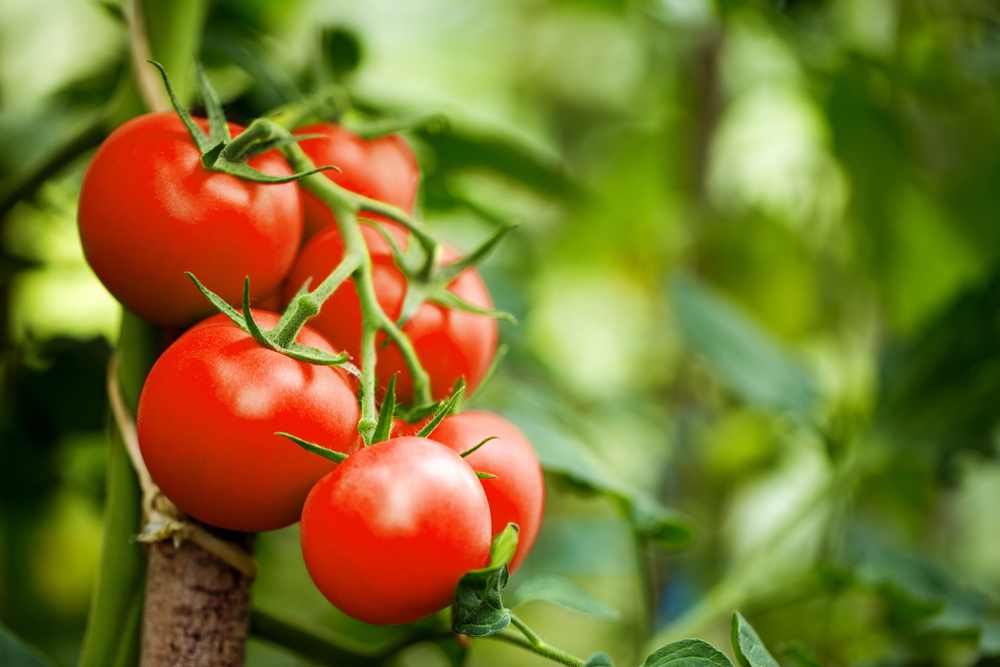 There’s a lot to love about tomatoes. Apart from their tangy sweetness, there’s a very good reason why you should increase your tomato intake. Lycopene, the pigment that gives tomatoes their distinct reddish hue, is also an antioxidant that strengthens cell walls, lowers LDL cholesterol, and can help prevent the formation of blood clots.
There’s a lot to love about tomatoes. Apart from their tangy sweetness, there’s a very good reason why you should increase your tomato intake. Lycopene, the pigment that gives tomatoes their distinct reddish hue, is also an antioxidant that strengthens cell walls, lowers LDL cholesterol, and can help prevent the formation of blood clots.
2. Dark Chocolate
 If you love dark chocolate, excellent news is ahead. You should know that the flavanols in every bar can help improve blood pressure and ward off certain types of heart disease. The flavanols in dark chocolate stimulate nitric oxide production in the body. Nitric oxide causes blood vessels to dilate, or widen, which improves blood flow and lowers your blood pressure.
If you love dark chocolate, excellent news is ahead. You should know that the flavanols in every bar can help improve blood pressure and ward off certain types of heart disease. The flavanols in dark chocolate stimulate nitric oxide production in the body. Nitric oxide causes blood vessels to dilate, or widen, which improves blood flow and lowers your blood pressure.
The even better news is that studies show that the beneficial effects of dark chocolate on blood pressure might be more significant in older people and those with a higher risk of cardiovascular disease. The key here is dark chocolate since other overly sweetened types of chocolate may not contain the same flavanol levels.
3. Lentils & Legumes
Out of the countless ‘superfoods’ out there, you’ll find that many of them are a part of the legume family. For instance, lentils have been known to reduce the risk of a variety of cancers while also helping in disintegrating arterial plaque buildup. Lentils are high in protein and fiber and low in fat, which makes them a healthy substitute for meat. Make sure you cook lentils thoroughly to break down the lectin content, which can lead to an upset stomach.
4. Garlic
 Garlic isn’t for everyone, except, of course, when it’s served atop a crispy pao with plenty of butter. Well, forget the butter for a minute and let’s focus on garlic. The aromatic onion is known to lower blood pressure, which in turn keeps our love muscle pumping for longer.
Garlic isn’t for everyone, except, of course, when it’s served atop a crispy pao with plenty of butter. Well, forget the butter for a minute and let’s focus on garlic. The aromatic onion is known to lower blood pressure, which in turn keeps our love muscle pumping for longer.
5. Almonds
 Mixed nuts are nice and all, but do you know what would be better? If you could eat unsalted roasted almonds. Research has indicated that almonds can destroy plaque buildup, thereby improving blood pressure and reducing the risk of strokes. If possible, roast your own almonds and use only a dash of salt as you need to boost their flavour.
Mixed nuts are nice and all, but do you know what would be better? If you could eat unsalted roasted almonds. Research has indicated that almonds can destroy plaque buildup, thereby improving blood pressure and reducing the risk of strokes. If possible, roast your own almonds and use only a dash of salt as you need to boost their flavour.
6. Turmeric
For more than a thousand years, people have turned to turmeric for its medicinal properties. It’s also the main flavoring component in curries as it gives such dishes their iconic yellow/orange hue. Turmeric is full of curcumin, a robust antioxidant that can lower the risk of thickened heart muscles. With more turmeric in your diet, you’ll have a lower risk of heart disease over time.
7. Beetroot
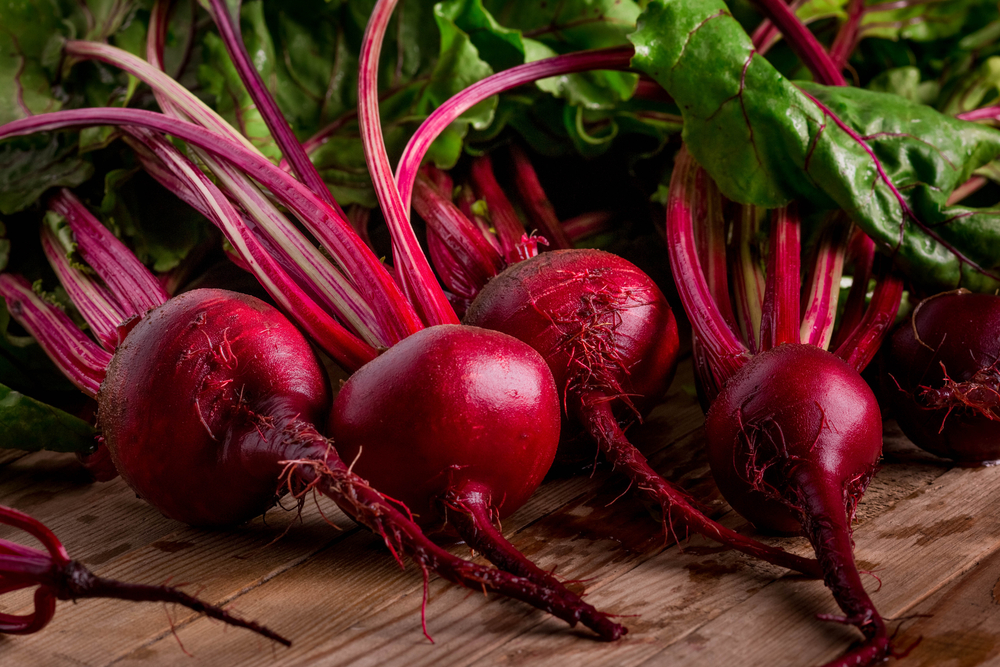 Beets get an unfair rep. Many people don’t like them for their earthiness and supposed over healthiness, but you should definitely give your taste buds a chance to get used to beets. . Their naturally sweet earthy flavour not only adds some crunch and texture to salads, but they also reduce homocysteine levels, which in turn can lower the risk of cardiovascular disease and stroke.
Beets get an unfair rep. Many people don’t like them for their earthiness and supposed over healthiness, but you should definitely give your taste buds a chance to get used to beets. . Their naturally sweet earthy flavour not only adds some crunch and texture to salads, but they also reduce homocysteine levels, which in turn can lower the risk of cardiovascular disease and stroke.
8. Fish like Sardines, Salmon and Mackerel
 When it comes to healthy fish options, salmon, sardines and mackerel are probably at the top of the list. They are packed with omega-3s, protein, and potassium and essential minerals—all of which serve to improve heart, brain, and muscle health. A word of caution on consuming too much canned salmon: it is high in sodium.
When it comes to healthy fish options, salmon, sardines and mackerel are probably at the top of the list. They are packed with omega-3s, protein, and potassium and essential minerals—all of which serve to improve heart, brain, and muscle health. A word of caution on consuming too much canned salmon: it is high in sodium.
9. Baingan aka Brinjal aka Egg plant
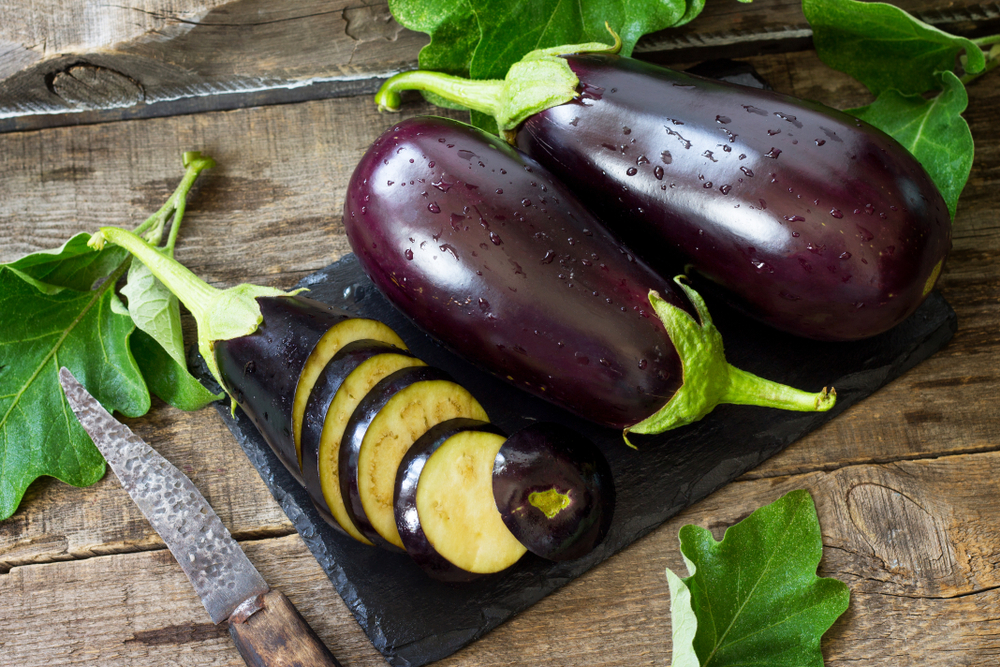 Like beets, eggplant can take some getting used to. They’re not particularly crunchy except when fried with a coat of semolina; in fact, their mushiness is what puts people off. But if you enjoy a delicious barta, you should know that its antioxidant content can lower blood pressure and the risk of stroke.
Like beets, eggplant can take some getting used to. They’re not particularly crunchy except when fried with a coat of semolina; in fact, their mushiness is what puts people off. But if you enjoy a delicious barta, you should know that its antioxidant content can lower blood pressure and the risk of stroke.
10. Chia Seeds
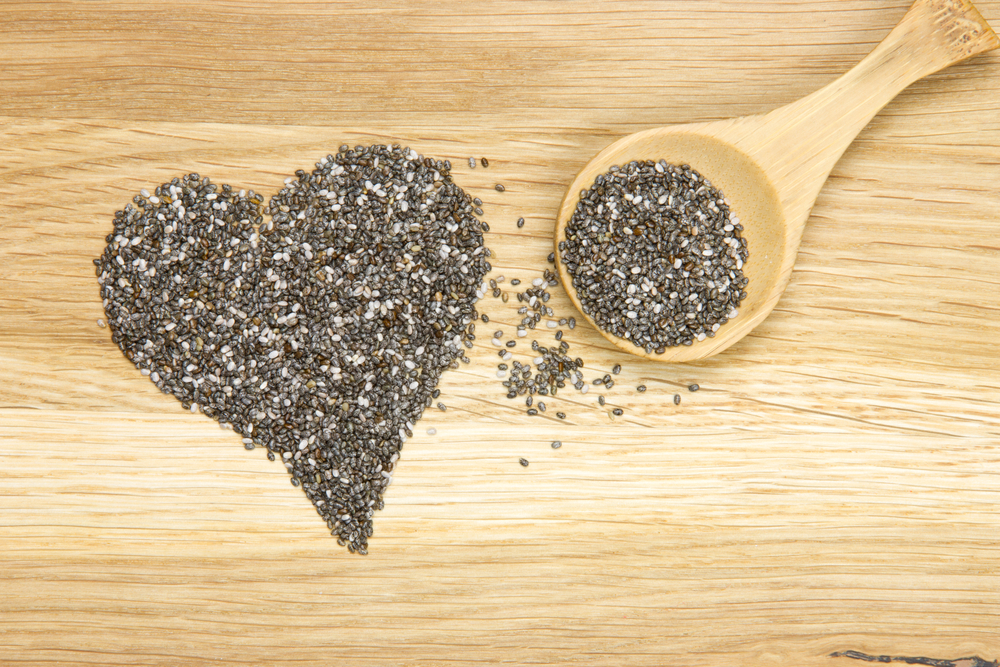 Chia seeds are another versatile superfood that goes perfectly in and on nearly any dish you can think of. If you’re unfamiliar with chia seeds, you should know that the black and white seeds are full of protein and fibre, as well as contain trace amounts of omega-3s. Together, these three nutrients can reduce blood pressure.
Chia seeds are another versatile superfood that goes perfectly in and on nearly any dish you can think of. If you’re unfamiliar with chia seeds, you should know that the black and white seeds are full of protein and fibre, as well as contain trace amounts of omega-3s. Together, these three nutrients can reduce blood pressure.
11. Apples
 Although an apple a day doesn’t really keep the doctor away, it might help you reduce how frequently you need to visit your cardiologist. In every juicy bite is a ton of antioxidants and minerals that do more than just keeping blood pressure within controllable levels. They can lower cholesterol levels, play a role in preventing certain cancers, and they’re a diabetic-friendly snack. Insider tip: Pair your apple with almonds or almond butter. A delicious combo which helps the apple go down easier.
Although an apple a day doesn’t really keep the doctor away, it might help you reduce how frequently you need to visit your cardiologist. In every juicy bite is a ton of antioxidants and minerals that do more than just keeping blood pressure within controllable levels. They can lower cholesterol levels, play a role in preventing certain cancers, and they’re a diabetic-friendly snack. Insider tip: Pair your apple with almonds or almond butter. A delicious combo which helps the apple go down easier.
12. Broccoli
 Broccoli is another one of those vegetables that gets underserved hate. Hating broccoli was the “cool” thing to do as kids, but they don’t even taste that bad! Broccoli can also help control cholesterol levels, clear arterial plaque, and assist diabetes patients in keeping blood sugar within tolerable levels.
Broccoli is another one of those vegetables that gets underserved hate. Hating broccoli was the “cool” thing to do as kids, but they don’t even taste that bad! Broccoli can also help control cholesterol levels, clear arterial plaque, and assist diabetes patients in keeping blood sugar within tolerable levels.
13. Coffee
 Let’s assume you’re one of the millions of people around the globe that just can’t function without that first mug of coffee in the morning. While the caffeine content is what gets you up, it can also keep your heart pumping for longer. A stronger heart pumps enough blood and oxygen throughout the whole body. Try and keep your coffee consumption within reason—umm, plus the milk and sugar that you may add to it. It’s black coffee that does the trick.
Let’s assume you’re one of the millions of people around the globe that just can’t function without that first mug of coffee in the morning. While the caffeine content is what gets you up, it can also keep your heart pumping for longer. A stronger heart pumps enough blood and oxygen throughout the whole body. Try and keep your coffee consumption within reason—umm, plus the milk and sugar that you may add to it. It’s black coffee that does the trick.
14. Avocado
 Whether you love them or not, avocados are a super superfood for a very good reason. Avocados are full of healthy fat, potassium, and antioxidants, all of which can help lower the risk of heart disease and stroke. Whether you like it in dip form (low salt, please) or sliced on toast, you should eat more avocado!
Whether you love them or not, avocados are a super superfood for a very good reason. Avocados are full of healthy fat, potassium, and antioxidants, all of which can help lower the risk of heart disease and stroke. Whether you like it in dip form (low salt, please) or sliced on toast, you should eat more avocado!
15. Carrots
 One vegetable we’re thankful that our kids love is carrots. You’ve undoubtedly heard that carrots can improve your eyesight, but how can they help your heart? It turns out that beta-carotene content, a robust antioxidant that gives carrots its unique orange color, can help reduce the risk of heart disease.
One vegetable we’re thankful that our kids love is carrots. You’ve undoubtedly heard that carrots can improve your eyesight, but how can they help your heart? It turns out that beta-carotene content, a robust antioxidant that gives carrots its unique orange color, can help reduce the risk of heart disease.
16. Flax Seeds aka Alsi
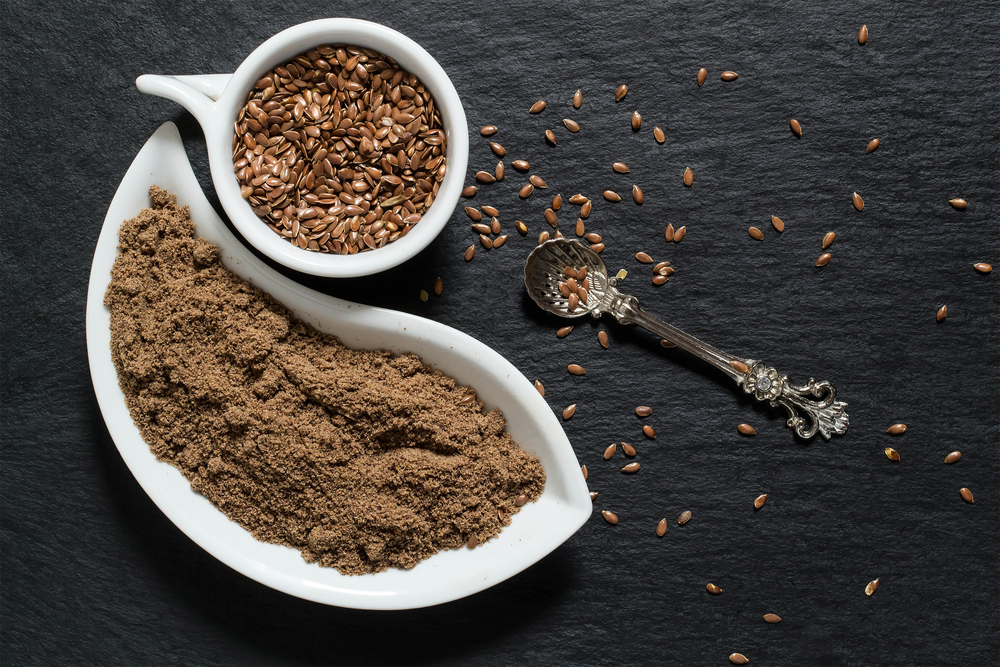 Flax seeds, like chia seeds, go well with anything, either as a topping or to give it body. That’s why fitness junkies love blending flax seeds in their smoothies. Well, the protein and fiber content is why, but did you know that the antioxidants and fatty acid can keep lower blood pressure and the risk of heart disease? Even more reasons why you should eat (powdered) flax seeds!
Flax seeds, like chia seeds, go well with anything, either as a topping or to give it body. That’s why fitness junkies love blending flax seeds in their smoothies. Well, the protein and fiber content is why, but did you know that the antioxidants and fatty acid can keep lower blood pressure and the risk of heart disease? Even more reasons why you should eat (powdered) flax seeds!
17. Ginger
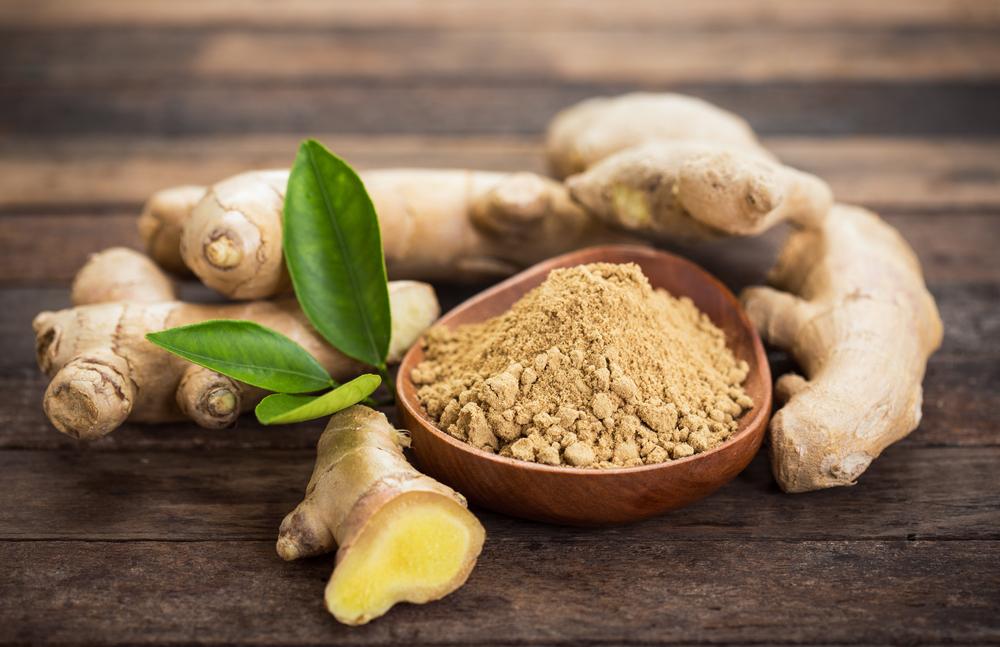 A tiny grating of ginger can really elevate your desserts and all foods to a new level. However, that’s only assuming you like eating ginger, to start with. If you do, you’ll be glad to know that ginger has been known to prevent heart disease. Grate your own fresh ginger and make a tisane to enjoy the full heart-healing effects of the earthy spice.
A tiny grating of ginger can really elevate your desserts and all foods to a new level. However, that’s only assuming you like eating ginger, to start with. If you do, you’ll be glad to know that ginger has been known to prevent heart disease. Grate your own fresh ginger and make a tisane to enjoy the full heart-healing effects of the earthy spice.
18. Grapefruit
 You might not know just how beneficial the vitamin C content, especially at lunch time in grapefruit can be for your skin, mind, and heart. Grapefruit can actually chip away at arterial plaque, promoting improved blood pressure and keeping heart disease at bay.
You might not know just how beneficial the vitamin C content, especially at lunch time in grapefruit can be for your skin, mind, and heart. Grapefruit can actually chip away at arterial plaque, promoting improved blood pressure and keeping heart disease at bay.
19. Green Tea
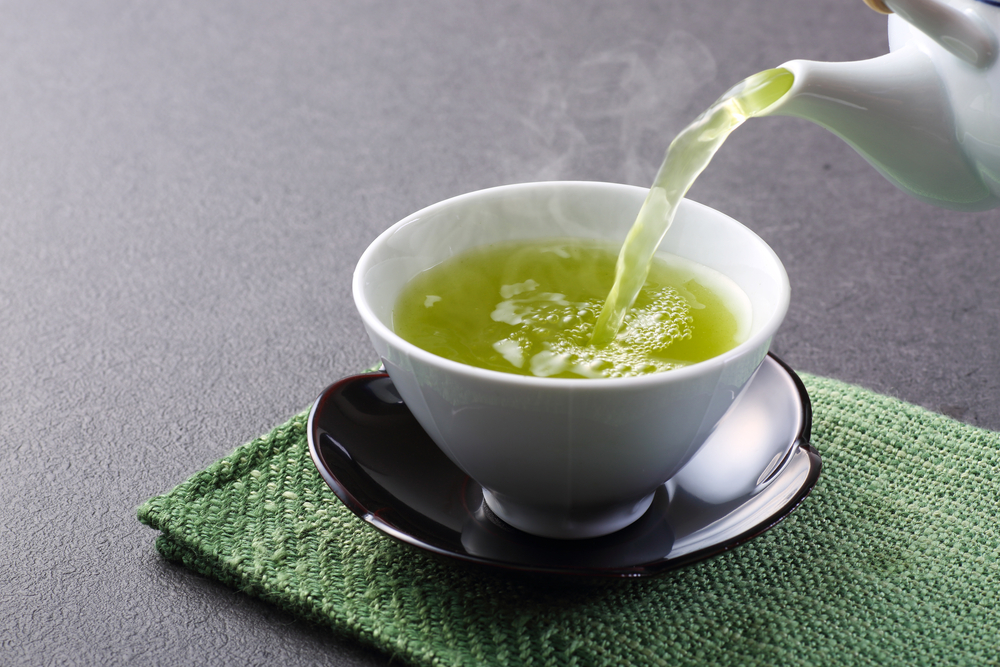 If you’re looking for a low-caffeine drink to replace your coffee addiction, try drinking tea instead. More specifically, drink green tea. It contains less caffeine than black tea, and it’s rich in antioxidants that can help reduce plaque buildup in our arteries. To get the full effects of green tea, drink it with a bit of honey. Avoid the matcha stuff with sugar and boba bubbles.
If you’re looking for a low-caffeine drink to replace your coffee addiction, try drinking tea instead. More specifically, drink green tea. It contains less caffeine than black tea, and it’s rich in antioxidants that can help reduce plaque buildup in our arteries. To get the full effects of green tea, drink it with a bit of honey. Avoid the matcha stuff with sugar and boba bubbles.
20. Pomegranate
 Pomegranates taste absolutely wonderful, but our only gripe with the bulbous fruit is that they’re so time consuming to open and peel! Once you’ve got your anar dana looking like stunning red garnets in a bowl, you should be excited to know that they’re rich in Vitamin C, which can make your skin look younger while also preventing certain cancers from forming. Some physicians might suggest eating more pomegranate if you have a history of heart disease.
Pomegranates taste absolutely wonderful, but our only gripe with the bulbous fruit is that they’re so time consuming to open and peel! Once you’ve got your anar dana looking like stunning red garnets in a bowl, you should be excited to know that they’re rich in Vitamin C, which can make your skin look younger while also preventing certain cancers from forming. Some physicians might suggest eating more pomegranate if you have a history of heart disease.
21. Kiwi
Last but definitely not least, we have kiwi. Kiwis are chock-full of vitamins B, C, and E, as well as magnesium and potassium. Together, these nutrients and antioxidants can regulate blood pressure, reduce the risk of blood clots from forming, leading to a healthier, happier, stronger heart.
The problem with heart disease is that the first symptom is often fatal, and just diet alone won’t do the work. Combine healthy eating with a lifestyle that is active, a mind that is balanced and an attitude of calmly going with the flow of things you can’t change; good health of heart, mind and body will be your reward.



